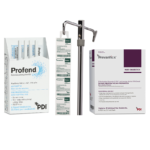Interventional Care


We notice that you are visiting us from . This site only services US-based visitors. Would you like to visit the site that is appropriate for your location?

Susceptibility of Candida auris and Candida albicans to 21 Germicides Used in Healthcare Facilities, authored by Rutala WA, Kanamori H, Gergen MF, Sickbert-Bennett EE, Weber DJ1 addresses the ability of 21 germicides to inactivate C. auris.
Candida auris is an emerging fungal pathogen that is often resistant to major classes of antifungal drugs. It is considered a serious global health threat as it can cause severe infections with frequent mortality in over a dozen countries. There is evidence that it can survive on healthcare environmental surfaces for at least 7 days and cause outbreaks in healthcare facilities. It is clear that infection prevention strategies, such as surface disinfection and hand hygiene, are essential to controlling transmission. There are limited data on the activity of antiseptics and disinfectants used in healthcare to inactivate this pathogen.
There is no standard level of germicidal efficacy for environmental surfaces, but most of the disinfectants tested (10/13, 77%) in this study, which demonstrated at least a 3-log10 reduction in 1 minute, are likely to be clinically effective against C. auris when used appropriately. Water-based quaternary ammonium compounds (QAC), which are commonly used for surface disinfection, had limited activity and therefore should not be used for disinfection of environmental surfaces or noncritical patient equipment in rooms housing patients with C. auris. QAC with alcohol, such as Super Sani-Cloth® Germicidal Disposable Wipes and Sani-Cloth® Prime Germicidal Disposable Wipe were effective against the C. auris AR Bank #0385 strain (3.9 and 4.1-log10 reduction, respectively) with a 1-minute contact time.
The EPA recently announced that products that wish to make a claim against drug-resistant C. auris must submit data using a specified test method and the C. auris strain AR Bank #0385 used in this study. Most antiseptics (7/9, 78%, e.g., 2% and 4% chlorhexidine gluconate [CHG], 0.5% triclosan, 10% povidone-iodine, 1% chloroxylenol, 3% hydrogen peroxide, and 1% CHG with 61% ethyl alcohol) did not achieve a 3-log10 reduction of C. auris in 1 minute. In conclusion, proper disinfection of environmental surfaces using disinfectants effective against C. auris is important to help prevent the spread of C. auris.
Disclosure: Dr. Rutala is a consultant for PDI.
1Rutala WA, Kanamori K, Gergen MF, Sickbert-Bennett EE, Weber DJ. 2019. Susceptibility of Candida auris and Candida albicans to 21 germicides used in healthcare facilities. Infect Control Hosp Epidemiol 40:380-382.